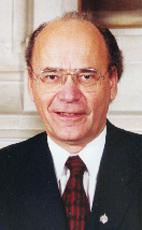Mr. Speaker, it is my pleasure today to draw your attention to the presence in this chamber of a delegation of French parliamentarians, led by the member for l'Eure, François Loncle, who is also the president of the French section of the Canada-France Interparliamentary Association and the president of the foreign affairs committee of the French national assembly.
During its visit, the French parliamentary delegation will be taking part in the Journée internationale de la Francophonie.
In addition, president Loncle will present his views on the theme of European defence to members of the foreign affairs committees of both chambers as well as to members of the Canada-Europe and Canada-France interparliamentary associations.
Finally, the French delegation will attend the annual general meeting of the Canadian section of the Canada-France Interparliamentary Association.
I am pleased to note the very high quality of the relations established between French and Canadian parliamentarians over the years and I wish our colleagues and friends a productive visit to Canada.

